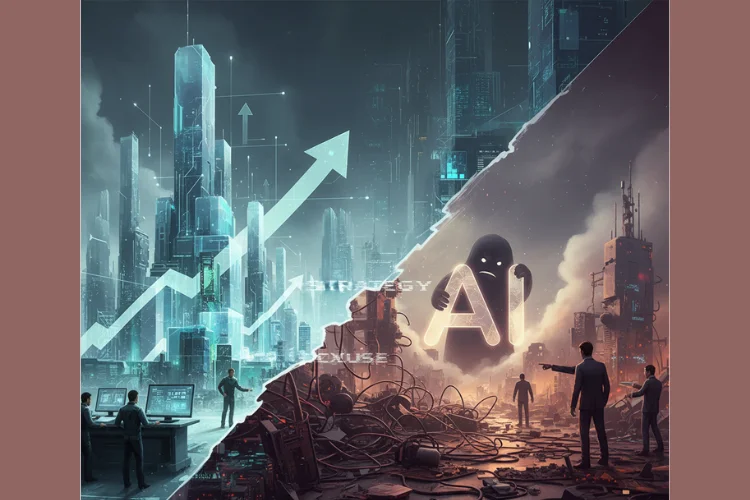1. Introduction: The Great AI Divide
Artificial Intelligence isn’t just transforming industries—it’s dividing them.
California has just passed what many call the most controversial AI regulation in U.S. history. The law aims to enforce transparency, accountability, and ethical deployment of AI systems. But not everyone is happy about it.
Major tech companies like OpenAI and Meta are fighting back, claiming the law could cripple innovation. Yet one company stands apart, saying, “We actually need this.”
Meanwhile, OpenDoor’s CEO just sent a memo demanding every employee become “AI native”—a move that’s either visionary or out of touch, depending on who you ask. And then there’s Walmart, which quietly dropped a statement about the future of work that no one saw coming.
These three stories aren’t isolated headlines. Together, they reveal the truth about the modern workplace: AI isn’t just a tool—it’s a test of leadership, ethics, and adaptability.
2. California’s Bold AI Regulation: Innovation or Overreach?
California has always been the heart of innovation. But this time, the state isn’t celebrating new tech—it’s trying to control it.
The California AI Accountability Act (as it’s informally called) is designed to make companies disclose when and how they use AI systems, especially those that impact hiring, finance, or healthcare. It also requires independent audits to prevent bias and misinformation.
Critics, including OpenAI and Meta, argue that such regulations will slow down progress. They fear developers will leave the state to avoid compliance burdens. Supporters, however, believe this law is a much-needed safeguard against the unchecked rise of algorithmic decision-making.
Interestingly, one tech company—still unnamed publicly—has broken ranks with Silicon Valley giants, saying regulation is not the enemy of innovation. It’s the foundation of trust.
The Fractional CTO Perspective
For startups and growing enterprises, this law poses both a challenge and an opportunity. A fractional CTO can guide businesses through compliance, helping them integrate ethical AI without slowing innovation. Fractional CTOs bring both technical expertise and strategic vision, allowing smaller firms to compete responsibly in a heavily regulated market.
Why It Matters
California’s move sets a precedent. If it succeeds, other states may follow. If it fails, it could push AI development offshore. Either way, the regulation is a defining moment in the relationship between technology and accountability.
3. OpenDoor’s “AI Native” Mandate: Visionary or Absurd?
The second major story shaking up the business world is from OpenDoor, a company known for disrupting real estate with data-driven technology.
In a leaked internal memo, OpenDoor’s CEO declared that every employee must become “AI native.” The phrase implies that using AI tools—like chatbots, data assistants, and code generators—should be as natural as sending an email.
The memo’s tone was bold, even aggressive: adapt or fall behind. Employees were told to embrace AI across every department, from sales to HR.
Mixed Reactions
The internet had a field day. Some praised the move as a necessary evolution, calling it “the new literacy of the digital age.” Others mocked it as a corporate gimmick that prioritizes buzzwords over real innovation.
But beyond the memes lies an important truth: the future belongs to companies that understand how to combine human creativity with AI efficiency.
The Reality Check
Becoming “AI native” isn’t as simple as installing ChatGPT or Midjourney in your workflow. It requires training, security compliance, and culture change. Employees need to know when to trust AI and when to rely on human judgment.
This is where fractional CTOs again play a crucial role. They help organizations transition into AI-powered workflows without chaos. They design governance frameworks, choose ethical tools, and prevent “AI for the sake of AI” adoption.
A Lesson for Every Company
OpenDoor’s bold stance exposes a dilemma all modern businesses face: are they genuinely using AI to improve productivity—or simply chasing the latest trend to impress investors?
4. Walmart’s Unexpected Statement: Redefining the Future of Work
While tech companies argue about AI’s role, Walmart—the world’s largest retailer—quietly issued a statement that surprised everyone.
Instead of focusing on automation and job cuts, Walmart’s leadership emphasized empowerment. Their message: “AI should enhance human capability, not replace it.”
This marks a radical shift in how corporations talk about automation. Rather than portraying AI as a cost-cutting weapon, Walmart framed it as a tool for employee growth. From predictive inventory to AI-assisted customer support, the company aims to make work more meaningful, not more mechanical.
Human-Centered AI
Walmart’s approach highlights a growing trend in ethical technology: the human-in-the-loop model. In this setup, AI assists decision-making but never fully replaces human oversight.
This philosophy aligns with what many ethical AI experts and fractional CTOs recommend—balance efficiency with empathy.
The Ripple Effect
When a company as large as Walmart takes a stand, the ripple effects reach far beyond retail. Smaller businesses, policymakers, and even competitors are now rethinking their own AI integration strategies.
By reframing AI as an empowerment tool, Walmart may have just set the tone for the next phase of the workplace revolution.
5. The Bigger Picture: AI as a Strategy or Excuse?
These three stories—California’s regulation, OpenDoor’s “AI native” mandate, and Walmart’s empowerment message—reflect one crucial question:
Are companies using AI as a legitimate strategy or as an excuse for bad decisions?
For some, AI has become a buzzword shield to justify layoffs, weak products, or rushed innovation. They claim “AI is the future,” but often fail to define what that means.
For others, AI represents a real chance to build smarter, fairer systems. The difference lies not in technology but in leadership.
What Smart Leaders Understand
- AI is not a magic bullet—it’s a multiplier.
- Ethical use builds trust, which builds long-term success.
- AI strategy must include governance, training, and transparency.
- A fractional CTO can ensure that innovation doesn’t come at the cost of ethics.
The companies winning the AI revolution aren’t just adopting new tools—they’re adopting new mindsets. They treat AI as a partner, not a shortcut.

6. Conclusion: Navigating the AI Workplace Revolution
The AI revolution isn’t coming—it’s already here. California’s lawmakers are setting guardrails. OpenDoor is pushing for cultural transformation. Walmart is redefining what it means to work alongside machines.
Each story shows a different side of the same truth: the future of work depends on how responsibly we integrate AI.
For startups, entrepreneurs, and innovators, this is a wake-up call. The key isn’t to fear regulation or chase hype—it’s to find balance. A fractional CTO can help bridge that gap, ensuring your business uses AI strategically and ethically.
As we enter this new era, the question isn’t whether AI will change everything—it already has. The real challenge is whether we’ll change with it, thoughtfully and responsibly.
At StartupHakk, we believe the next generation of leaders won’t just use AI—they’ll understand it, question it, and shape it for the better.




